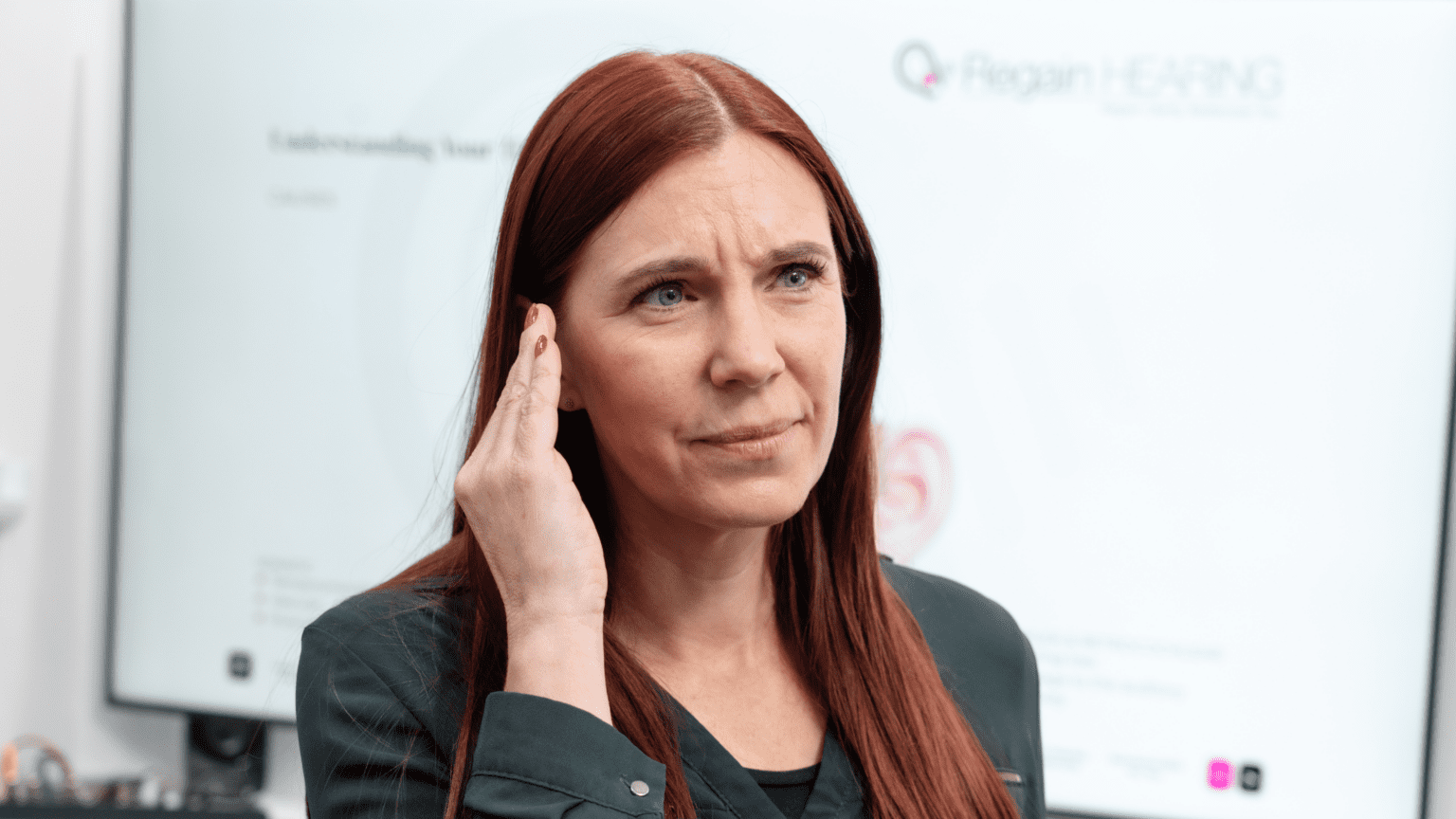The question regarding the severity of tinnitus sound and depression has been extensively researched.
In our experience at Regain Hearing, when treating tinnitus, many of our patients tell us they also struggle with stress, anxiety, and depression due to their tinnitus symptoms. But we wanted to look into this further.
In this post, we look at several studies performed to investigate if there is a link between tinnitus, depression and anxiety symptoms.
The link between anxiety and depression
According to one study, one to seven individuals with chronic tinnitus frequently co-occur with psychiatric problems like anxiety and depression. Even more concerning, is that tinnitus, besides being irritating and distressing, has also been shown to increase the likelihood of suicide. Research has also indicated that the severity of tinnitus symptoms is sometimes reduced when depressive symptoms improve.
Additionally, research has shown that tinnitus is linked to sleep issues, such as insomnia, making it difficult to get to sleep and stay asleep. In turn, this lowers the overall level of sleep quality. Individuals with these conditions frequently experience higher anxiety, concentration issues, and general irritability.
Can Tinnitus cause depression?
- In June 2021, The Cochrane Library, the Newcastle-Ottowa Quality Assessment Scale was used to identify studies on tinnitus and depression based on relevance and assessment of the likelihood of bias. It was found that 31 out of 33 studies revealed substantive connections between the distress levels associated with tinnitus and depression symptoms.
- In other research, The Gutenberg Health study looked at the relationship between tinnitus and depressive symptoms, anxiety disorders, or somatisation. Individuals with tinnitus symptoms also had a considerably greater prevalence of depression, anxiety, and somatic physical symptoms than individuals without tinnitus.
- During another study, every individual underwent pure tone audiometry and pure tone audiometry tests to screen for hearing impairment. The Tinnitus Handicap Inventory (THI), whose credibility and dependability have been established, was utilised to evaluate the severity of tinnitus symptoms. This research showed that hearing loss and tinnitus are more common as individuals get older.
Furthermore, it demonstrated that individuals with moderate or greater severity of tinnitus showed a link with statistical significance with symptoms of depression and anxiety. Overall, it’s clear from these studies and the research that we have reviewed that there is a strong correlation between tinnitus, depression, and anxiety.
What do our audiologists say?
Tinnitus and depression often go hand in hand. The constant noise can be exhausting and overwhelming, which can lead to feelings of frustration and hopelessness. It’s important to address both the physical symptoms of tinnitus and the emotional impact it has, as managing one can significantly improve the other.” Lindsay Fletcher (nee Stride) (RHAD), (BSHAA), FdA
Can depression cause tinnitus?
How about the other way around? Can depression cause ringing in the ears?
While depression itself does not directly cause tinnitus, the two conditions are often interconnected and can influence each other. Here’s how:
- Stress and Anxiety – Depression is frequently accompanied by high levels of stress and anxiety, which are known to exacerbate or trigger tinnitus. Stress can cause or worsen the perception of ringing or buzzing in the ears.
- Changes in Brain Function: Depression can affect the way the brain processes auditory information, potentially making tinnitus more noticeable or bothersome. The emotional centres of the brain can amplify the distress associated with tinnitus.
- Medications – Some medications used to treat depression, particularly certain antidepressants, can have tinnitus as a side effect. However, this is not common and varies depending on the medication and the individual.
Tinnitus Sound and NHS Treatment Options
Your GP may have advised you that you can be referred for severe or chronic tinnitus to a specialised audiology service through the NHS. While NHS tinnitus treatment may be effective, you could wait many months for an appointment.
Treatment provided could consist of:
- Tinnitus counselling — This can assist you in understanding the condition and creating coping mechanisms to help make it more manageable.
- Cognitive behavioural therapy (CBT) — Participating in CBT can help you feel less anxious and modify your way of thinking about having tinnitus.
- Tinnitus retraining therapy — teaches your brain how to zone out and become less conscious of tinnitus sound through sound therapy. This is only offered if you are diagnosed with chronic or severe tinnitus.
Advancements in Tinnitus Treatments in the UK
Masking
This entails exposure to background noise that isn’t too loud or music to assist in “masking” the tinnitus noise and making it easier to ignore. White noise machines, fans, and wearable devices that can be worn in the ear, like hearing aids, are some examples of the equipment used in this sound treatment.
Generally, individuals with tinnitus have been shown to be risk-free and at ease using masking equipment. Nevertheless, masking treatment for tinnitus may have some unintended consequences, such as causing an increase in the level of tinnitus sound and elevated anxiety.
Habituation
Tinnitus can be treated through habituation therapy, which teaches the brain to grow less conscious of the ringing or buzzing tinnitus sound. You listen to tinnitus-like sounds so often during habituation therapy that, finally, they fade from your mental awareness.
It’s similar to wearing glasses and eventually forgetting you have them on. But naturally, everyone’s time frame for accomplishing this is different. For the intended effect, you may need targeted therapy under supervision for up to two years.
Sound Therapy
Tinnitus perception may decrease with sound therapy, which may also enhance everyday life and mental wellness. Tinnitus sound therapy has been shown in research published in the International Journal of Audiology to lessen anxiety caused by tinnitus symptoms and enhance sleep.
Another study indicated that tinnitus sound therapy led to functional and structural modifications in the neural network. It was originally published in Frontiers in Neurology in 2021.
3 Alternative Ways to Reduce Tinnitus Symptoms
1. Diet and Nutrition
Eating foods that improve brain function, such as salmon, walnuts, avocado, and eggs, and food containing magnesium and zinc may assist with alleviating tinnitus discomfort. Reducing tinnitus symptoms may also be helped by avoiding processed foods, coffee, and alcohol.
2. Adequate Sleep
Aiming for seven to eight hours of sleep per night is advised by doctors and other medical professionals and may help alleviate anxiety and tinnitus symptoms. Adequate sleep is also essential for general wellness.
3. Lowering Anxiety Levels
Yoga and meditation are two approaches that may help to alleviate the symptoms of tinnitus. These approaches could be especially beneficial in lowering your anxiety levels, which have been linked to worsening tinnitus symptoms.
Tinnitus Treatment at Regain Hearing in London and Kent
Although there remains a lot that is unknown regarding the relationship between tinnitus and mental health issues, treatments have been shown to be capable of reducing tinnitus sound and its effects. Our private audiologists at Regain Hearing specialise in individualised tinnitus treatment.
We have been providing tinnitus treatments since 2013, which have been consistently revised to ensure we use the very latest techniques. Our patients have told us that their tinnitus symptoms have been reduced or even eliminated with our personalised tinnitus treatment plans.
Frequently asked questions
Does tinnitus cause anxiety?
Yes, tinnitus can cause anxiety, as the constant ringing or buzzing in the ears can be distressing and difficult to ignore. The persistent noise can interfere with concentration, sleep, and everyday activities, leading to feelings of frustration, stress, and anxiety. The uncertainty about the cause and duration of tinnitus can further contribute to anxiety, creating a cycle where anxiety worsens the perception of tinnitus, making the condition even more challenging to manage.
How long does anxiety tinnitus last?
The duration of anxiety-related tinnitus varies widely from person to person. In some cases, it may last only as long as the anxiety episode or stressful period, resolving when the individual’s anxiety is reduced. However, for others, tinnitus may persist even after anxiety levels decrease, especially if the tinnitus becomes chronic. Managing anxiety through relaxation techniques, therapy, or medication can help reduce the impact of tinnitus, but the condition’s persistence depends on its underlying causes.
What happens if tinnitus is left untreated?
If tinnitus is left untreated, it can lead to a range of negative consequences. Persistent tinnitus may cause significant disruptions to daily life, affecting sleep, concentration, and overall quality of life. This can lead to further mental health issues such as depression, heightened anxiety, or social withdrawal. Untreated tinnitus can also exacerbate hearing difficulties, making communication more challenging. While tinnitus itself is not typically harmful, addressing it early can help mitigate these potential complications and improve overall well-being.
If you’re experiencing tinnitus symptoms or have any concerns about your hearing health, contact us to arrange a tinnitus assessment at one of our clinics or at home with the specialists at Regain Hearing.




 Tinnitus and depression often go hand in hand. The constant noise can be exhausting and overwhelming, which can lead to feelings of frustration and hopelessness. It’s important to address both the physical symptoms of tinnitus and the emotional impact it has, as managing one can significantly improve the other.”
Tinnitus and depression often go hand in hand. The constant noise can be exhausting and overwhelming, which can lead to feelings of frustration and hopelessness. It’s important to address both the physical symptoms of tinnitus and the emotional impact it has, as managing one can significantly improve the other.” 



